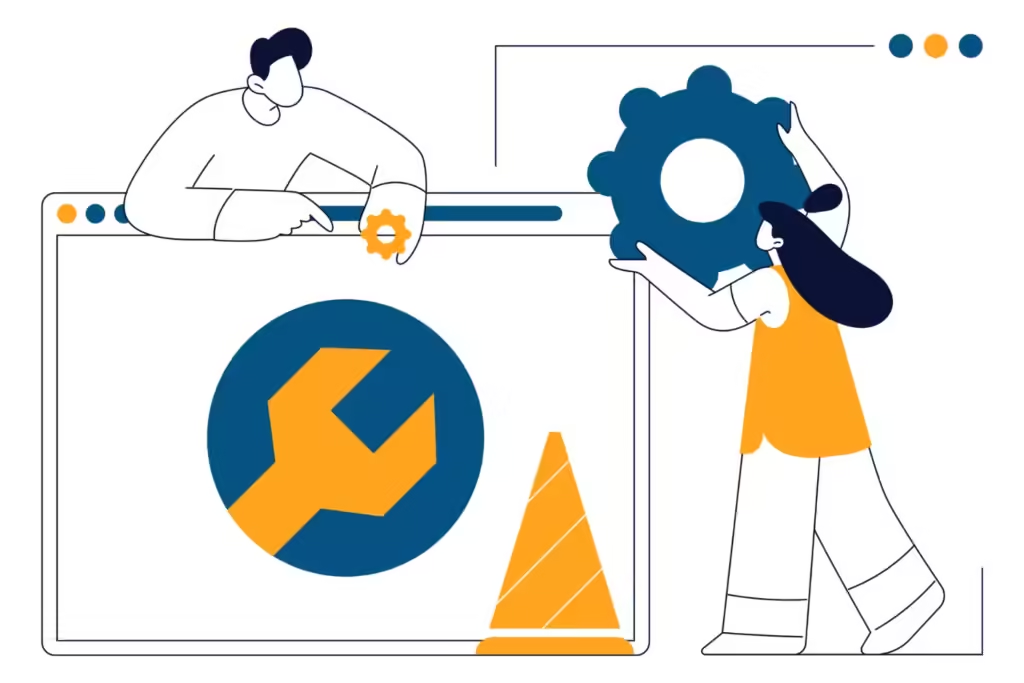Like other aspects of your business’s digital marketing, your website needs regular upkeep to ensure everything runs smoothly. Website maintenance is an ongoing process, even if you recently launched a new one.
From site security risks to optimal SEO performance, learn more about web maintenance and management and why keeping up is imperative.
What is Website Maintenance?
Website maintenance means, as the name suggests, taking care of your site as needed.
Your security software will eventually need to be updated to new versions to maximize your site’s protection from new cyber threats. Sometimes, there’s a significant shift in Google’s algorithms, and different aspects of website SEO need different optimization, like its new AI search engine, Search Generative Experience.
There are even website accessibility laws, where your site must be ADA-compliant for users with disabilities.
The digital landscape is ever-evolving, and your business website must adapt quickly. That’s where web maintenance comes in. It prevents your site from experiencing several online risks and performance issues.
What is Website Management?
Website management and maintenance are interconnected. Maintaining your site falls under the management umbrella. However, site management is more than updating it as necessary. It involves monitoring your website’s overall performance and uploading new content as part of your digital marketing efforts.
Web management and maintenance are both key focuses for keeping your site’s functionality and health in top shape.
Why Web Maintenance & Management is Necessary for Businesses

Website management and maintenance are essential for businesses. Learn why investing in these services is necessary for your bottom line below.
Prevents Site Security Risks
Your website’s security is arguably the most important reason to take care of it. If your site’s platform hasn’t been updated to the most recent version or has expired SSL certificates, your business is at serious risk because your data isn’t protected.
During site maintenance, web developers scan it for these potential security issues to prevent you from cyber attacks, malware, and leaked sensitive information.
Strengthening your site’s security typically includes:
- Updating security codes
- Re-certifying SSL
- Installing web application firewalls (WAFs)
- Implementing multi-factor authorization (MFA)
- Limiting user access settings
With a 72% increase in data breaches last year alone and at a record high, now, more than ever, it’s critical to safeguard your company’s website from cyber crimes.
Strengthens SEO Performance
Google’s algorithms are constantly changing, and your website needs to keep up for optimal SEO performance, including on-page, off-page, and technical SEO.
SEO website management and maintenance tasks may require:
- Technical SEO: Compressing large media files to increase site speed, fixing broken links, redesigning pages for mobile responsiveness, etc.
- On-Page SEO: Optimizing metadata with new target keywords, including page titles, meta descriptions, image alt text, and fixing related issues like duplicate content or word count limits, etc.
- Off-Page SEO: Creating sitemaps for crawling or indexing issues on Google Search Console, removing toxic backlinks, etc.
It ensures your site maximizes its online visibility for search engines and target audiences.
Saves Your Website From Data Loss
Another major impact of website maintenance is saving it from data loss with routine backups. Whether you accidentally deleted files, have a hardware failure, transferred information incorrectly, or experienced malware, these are the most common reasons your entire website’s data can become lost.
If you don’t regularly back up your site, you’ll have nowhere to recover it. You may lose customer contacts, saved passwords, complex codes your developers created to customize your site, and more.
Website backups make a copy of your existing site by safely storing it offline or in a secure cloud so you can always recover the most recent version. How often you should back up your website depends on how frequently you update it.
If you only post monthly blogs, backing up your site at that rate should be sufficient. If you’re redesigning your site, backing it up daily or weekly is recommended.
Supports Your Bottom Line

Web maintenance strengthens its user experience (UX), which, in return, supports your bottom line. Even if you regularly take care of your site, any updates may negatively impact its UX.
For example, large media files like background videos may significantly slow your site’s page load speed. In today’s digital age, 40% of users will leave a website if it takes more than three seconds to load. During maintenance, web developers may recommend compressing these files or replacing them with new media that doesn’t slow your site down.
Additional UX site maintenance tasks may include:
- Adding breadcrumbs for users to navigate your site pages more easily
- Installing one-click checkout to increase cart conversions
- Uploading clearer visuals for a sleeker site design and a stronger brand impression
Website Maintenance FAQs
Below are some common FAQs about web maintenance asked by businesses.
How Often Should I Maintain My Website?
As mentioned above, how often you should maintain your website depends on how frequently you update it. If you change it daily, weekly, or monthly, your site maintenance should meet this same rate. That way, you can recover the most recent version of it should you lose any data and ensure it always performs as it should.
How Much Does Maintaining a Website Cost?
Site maintenance costs depend on several factors, including:
- Website size
- Website platform
- Web developer rates
- What you’re updating: (Ex: domain names, SSL certificates, web hosting providers, content updates, SEO optimization, etc.)
In 2024, the average pricing for web maintenance plans ranges between $15 and $300 per month.
Should I Hire a Website Maintenance Company or DIY?
While some web maintenance tasks may be doable yourself, like on-page SEO, there are risks your business poses without prior experience. Complex tasks, like site security updates, should be done by web developers to prevent related risks. You’ll also spend more time and resources doing it yourself instead of professionals who can do it quickly and more efficiently.
What’s Included in Professional Web Maintenance Plans?
Professional web maintenance services offer various plans, depending on the company. Most web developers will include plug-in updates, site theme changes, security scanning, and website backups in their plans.
Keep Your Site Updated & Safe with Professional Web Maintenance Services
Because web maintenance is ongoing, you may not have the time to commit to these necessary tasks. You have to manage your business while being an expert in your trade. At Reach Marketing Pro, we can lift this workload off your shoulders and ensure your website performs as it should.
We’re a full-service digital agency with extensive experience in web design, maintenance, development, and management. Our site maintenance services include technical support, UX design changes, WordPress updates, and more.
Learn more about our website services or contact us for questions about how we can upgrade your site today!

